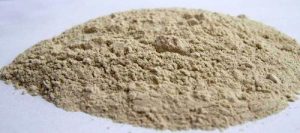Petroleum engineers and those in geological sales have all been acquainted with the material, bentonite. This material is an impure clay, made up mostly of montmorillite. There are three different types of bentonite, and each is conveniently named after is main element, sodium bentonite, calcium bentonite, and potassium bentonite. This article will focus mostly on the sodium bentonite as it is the one most commonly used in drilling oil and gas wells.
Like most clays, sodium bentonite expands when wet and exhibits useful colloidal properties. The swelling capacity gives bentonite its most important feature of creating a sealing, low permeability barrier within the borehole. Another main feature of bentonite is its ability to cool and lubricate the down-hole tools, remove cuttings, and to help prevent blowouts. When a small quantity of bentonite is suspended in water, it creates a viscous, shear thinning (decrease in viscosity with higher stress) material. At even higher concentrations (greater than 60 grams per liter), bentonite begins to form a gel-like material. This property is what makes it useful in preventing blowouts. As it is deposited on the interior of the well bore, and water begins leaching from it, a mud cake is formed. This is a relatively thick build-up of low permeability material. Not only does this material help stop formation fluids from entering the borehole, it also helps stop drilling fluid entering the formation, possibly damaging it and decreasing return.

Bentonite also serves to make other products and activities better. Have you ever built a sand castle on the beach? Well if you have you may have noticed that on some beaches, the sand sticks together much better than others. Silica and shell grains do not have the binding and swelling properties of bentonite so bentonite barren beaches will not work as well for sand castles. It is also used in manufacturing applications such as building model rocket nozzles, cat litter, and a clarifying agent in wines, liquors, ciders, beer, vinegar, and much more. The absorbing property will serve to pull out proteins in the spirits, keeping them clear.
Specifications for drilling grade bentonite according to API 13A are as follows:
API Grade:
| Suspension Properties | API Specification |
| Viscometer Dial Reading at 600 r/min | Minimum 30 |
| Yield Point/ Plastic Viscosity Ratio | Maximum 3 |
| Filtrate Volume | Maximum 15.0 mL |
| Residue of Diameter Greater than 75μm | Maximum Mass Fraction 4.0 % |
OCMA Grade:
| Suspension Properties | API Specification |
| Viscometer Dial Reading at 600 r/min | Minimum 30 |
| Yield Point/ Plastic Viscosity Ratio | Maximum 6 |
| Filtrate Volume | Maximum 16.0 mL |
| Residue of Diameter Greater than 75μm | Maximum Mass Fraction 2.5 % |
By John La Rue
Global Energy Laboratories Technician
Check out our other social media pages!